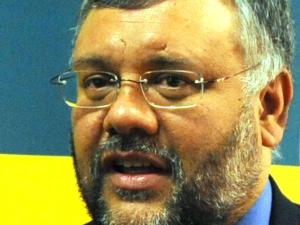
South Africa�s ambassador to the US, Ebrahim Rasool, is batting very ably for MTN to prevent it falling foul of the US�s very tough and far-reaching sanctions against Iran and those who do business with it.
Rasool, according to diplomatic sources, has twice managed to dissuade the US government from naming MTN in recent proclamations listing entities which are to be sanctioned. The most recent one was just before Thanksgiving late in November.
The cellphone service-providing contract MTN has in Iran � sharing the cellphone business with just one other state-owned company � is a lucrative component of MTN�s business.
But it has been seriously threatened this year, on two fronts.
The first was by allegations levelled at it in a US court by the Turkish cellphone company Turkcell that it bribed Iranian and South African government officials to ensure Tehran switched the contract from Turkcell to MTN Irancell, its Iranian operation.
That is still working its way through the US judicial system.
The other, and possibly greater, threat against MTN is the thorough and aggressive package of sanctions President Barack Obama slapped on Iran earlier this year, also designed to pressure it to abandon its nuclear weapons programme, which it denies having.
The special feature of these sanctions is their effect on Third World countries; in essence any foreign government or company which does business with Iran potentially falls foul of the US sanctions and can as a result be cut off from doing business with the US.
US investors have a big stake in MTN, so the potential effect on the company is severe. MTN also does lots of other business with the US, through service contracts with US cellphone companies, etc.
So Rasool has had his work cut out for him trying to keep MTN off the sanctions list.
According to diplomats familiar with the issue, Rasool has taken two tacks: the first is to argue with the US administration that a healthy and viable MTN is a key component of Africa�s telecoms � because of the company�s heavy involvement in several countries across the continent, most notably Nigeria.
And that if MTN loses its critical Iranian leg, it could cripple the company�s ability to help in the roll-out of cellphone services across the continent.
That argument is fairly persuasive to a friendly Obama administration but doesn�t quite do the trick in the hard-nosed wider US political establishment where Republicans are strong in Congress, for example.
For that wider audience, the argument needs to be focused more on the US�s direct national interests.
And so Rasool has been arguing that if the current Iranian regime were to fall at some point to the democratic opposition � a result Washington would presumably want � would the US prefer to have just the one state-run cellphone service provider left in Iran? Or would it not be better if there was also an independent cellphone company, namely MTN Irancell?
This argument also, evidently, alludes to accusations that MTN Irancell had agreed � as a condition for getting the contract in the first place � to allow the Iranian government to monitor the voice, data, fax and text messages of its subscribers, something MTN has declined to comment on.
Minister of International Relations and Co-operation Maite Nkoana-Mashabane recently wrote to her US counterpart, Hillary Clinton, to make the case for MTN at a higher level.
South Africa is also fighting a similar battle to avoid falling foul of the oil sanctions which are part of the same US package, although in that case, it has been able to take some evasive action by cutting back on its oil imports from Iran.
That option is not available for MTN, leaving a major diplomatic challenge.
And a good example, incidentally, of the importance of having good relations with the US, which South Africa has not always had, and which some in government have tended to disparage as unnecessary.
By Independent Online
The Iran Project is not responsible for the content of quoted articles.











